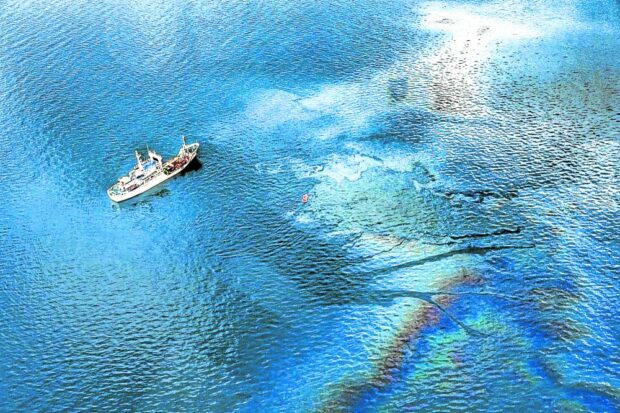
GLISTENING PROOF Photo taken during an aerial inspection conducted by President Marcos and the Philippine Coast Guard on April 15, 2023, shows the coastal waters of Oriental Mindoro province still bearing traces of the Feb. 28, 2023 oil spill from the sunken MT Princess Empress. —Malacañang photo
LUCENA CITY—One year after the catastrophic oil spill off Naujan, Oriental Mindoro, water quality in some areas still shows toxicity that could pose risks to human and marine species.
Fr. Edwin Gariguez, lead convener of the group Protect Verde Island Passage (VIP), said the oil spill, “is not just an awful memory.”
“The water quality results speak volumes about how this environmental disaster still clings to the waters of VIP a year later and the call for justice shall remain,” Gariguez said in a statement by the Protect VIP on Thursday.
Protect VIP is a network of civil society and faith-based groups, youth and community stakeholders united in the fight to preserve the fragile marine corridor in the Verde Island Passage between mainland Luzon and Mindoro Island.
On Feb. 28 last year, MT Princess Empress sank off Naujan town in Oriental Mindoro, within the VIP corridor, while carrying some 800,000 liters of industrial fuel.
The incident, the first marine environmental crisis of the Marcos administration, resulted in a significant oil spill that impacted coastal areas in the provinces of Oriental Mindoro, Batangas, and as far as Antique and Palawan.
Protect VIP reported that the Center for Energy, Ecology and Development (CEED) conducted three water quality tests, “with results indicating that the water quality in the VIP fails to meet the standards for protected waters.”
The group noted the result showed that all three Marine Protected Areas (MPAs) failed the water quality guidelines set by the Department of Environment and Natural Resources (DENR) for oil and grease in Calapan, Naujan, and Mansalay, all in Oriental Mindoro province.
Four of the six MPAs in Pinamalayan and Pola towns also failed the DENR standards, the Protect VIP added.
VIP traverses through the provinces of Batangas, Marinduque, Romblon, Occidental Mindoro and Oriental Mindoro, which was recognized as the “center of global shorefish biodiversity” due to the high densities of marine resources in the area.
The lives of more than two million people from five provinces are inextricably connected to VIP, their main source of livelihood.
Gariguez urged the government to provide legal protection for the VIP, “not only for its biodiversity but also for the vulnerable communities reliant on it.”
“This begins by limiting destructive industries from proliferating around the VIP by declaring it a protected seascape under the Expanded National Integrated Protected Area Systems Act,” the priest said.
On Tuesday, the Catholic Bishops’ Conference of the Philippines also called on the government to hold the culprits behind the oil spill accountable.